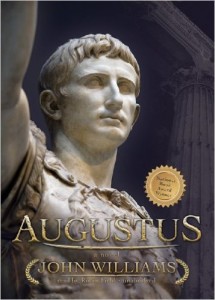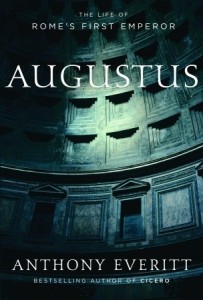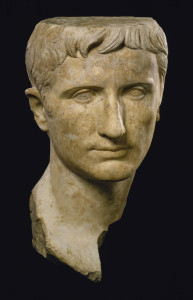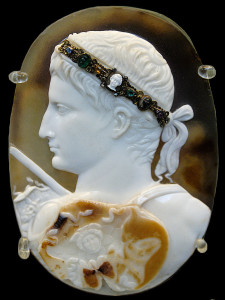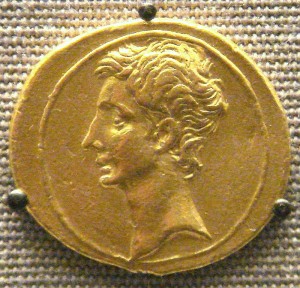 Hereditas Nexus was able to interview Adrian Goldsworthy in the Embassy Hotel in Amsterdam, because his latest book Augustus is coming out in a Dutch translation this week. Earlier this week we published the first part of this interview about Goldsworthy’s fascination with the Romans and his upcoming book Pax Romana. In this follow-up we focus on his book of Augustus. As a cherry on top of the cake, Goldsworthy also tells about his next project about Philip II of Macedonia and Alexander the Great.
Hereditas Nexus was able to interview Adrian Goldsworthy in the Embassy Hotel in Amsterdam, because his latest book Augustus is coming out in a Dutch translation this week. Earlier this week we published the first part of this interview about Goldsworthy’s fascination with the Romans and his upcoming book Pax Romana. In this follow-up we focus on his book of Augustus. As a cherry on top of the cake, Goldsworthy also tells about his next project about Philip II of Macedonia and Alexander the Great.
Q Now let’s talk about your book about Augustus. In your introduction you state that there wasn't a good complete biography of Augustus. What new insights does your book present on the life and times of emperor Augustus as opposed to the already existing literature?For example the books by John Williams and Anthony Everitt.
A They are fine, but with Everitt in particular you get the impression that Augustus lives up to about 30 BC and beats Antony and then suddenly is an old man, wondering who is going to succeed him. The thirty, forty years in between is just gone. There are good books, I’m not trying to say that everything that is written before is terrible and that my book is better. I think it’s very useful to go back and a sort of traditional, old fashioned way writing history and that’s biography, where you stick very closely to the chronology and it’s presented as a narrative. So that you emphasize where a person is at each stage of his life and what they’re doing. You can read biographies about Julius Caesar and because the author isn’t really interested in the military side, skip over Gaul and yet the last third of his life was spend with the army on campaign. That experience is very different than being in Rome, in the politics. It is bound to affect the way someone behaves. What they’re capable of doing as well. With Augustus that’s important. One of the things that surprised me the most about it… When I was a student, I was taught about Augustus, I taught courses about Augustus and I’ve read a lot. It had not really come home to me how much he has travelled. I always think of Hadrian as the emperor traveller, but Augustus after Actium spends more time away from Italy than actually there, let alone in Rome. He visits every province of the Empire, usually more than once. That sense of someone who even when they’re into their sixties and early seventies and has never been that healthy a man, never been that robust, spends all that time traveling, going from place to place. That means that people who want to see him, have to travel to where he is. You hear about an embassy from India arriving when he is in Tarragona, in Spain, in the twenties BC. You start to get a very different sense of the world. In a curious way which I didn’t push too far in the book, but there’s almost a sense like the emperors of the later third and fourth centuries AD, constantly on the move without really a capital or such. Even to the sense when he has someone like Agrippa or Tiberius and Drusus doing the same thing somewhere else. Someone who is more senior than governors, who has given the power to go on this constantly. That I didn’t expect, it made me realise how much of what we think that is the normal rule of an emperor really is set by Tiberius, who is old and doesn’t want to travel and who eventually goes to Capri and retreats all together. You tend when you’re teaching students, you tend to love everything together. You start with the Principate, Augustus comes along and then everything is the same up to Septimus Severus. The differences are considerable. That sort of thing was useful. You don’t necessarily see it, unless you’re looking at what he’s doing and where he is. So I think that’s worth doing.
Q And what, in your opinion, was the key to his success?
A There are a lot. The first one the Romans would admit is that Julius Caesar is responsible for his luck. Augustus is lucky. Things don’t always work for him, but he managed to survive, he learns from them and doesn’t make the same mistake twice. But again, you have to remember how long of a career he has. When I was teaching, even when I was teaching first year students at university, you had to look at them and say that Augustus is younger than you when Caesar was murdered. Can you possibly imagine going off, raising an army and plunging yourself into a civil war and saying ‘I’m going to be the supreme man of the state’ on your nineteenth birthday. Again, it’s hard to remember. We usually just see him as one of this great people from Antiquity and he just did this things. The confidence, the belief in himself and that he just could get away with it, you can understand no one took him seriously first. Cicero: ‘just a kid’, Mark Antony: ‘a boy who owes everything to a name’. it is staggering that enough people believed in him and believed in the money he had to pay them. They rallied to him as soldiers, they fought for him and he kept winning. Rome is, even more than the modern world, a society structured around age. You can’t start for the consulship till you’re forty-two. He hasn’t done anything, he has no experience. He doesn’t know how to lead an army, he doesn’t know how to conduct himself into politics, he’s still pretty much at school. The behaviour then is different of the behaviour of the middle-aged, the older Augustus. The situation is different. At that first stage, that murderous rise to power, because he does kill a lot of people. He is ruthless, no more or no less ruthless than all the others out there, but it still doesn’t justify what he’s doing. So I think there is the incredible self-belief. He considers himself special: ‘I’m going to do this’. A part of it, is his instinct to gamble: I throw the dice and will come up in my favour or I’ll do it again. The belief that I’m bound to win. He’s very good in taking an opportunity. When you think that this is the man who fights against Mark Antony and a few months later makes an alliance with him when it’s convenient and fights the people he has just been allied with. In later life of course you have the final confrontation with Antony. His opportunism, he seizes the moment which is good for him now, OK then he does it and it gets him a bit further along. But even so before he’s twenty he belongs to the three most important men of the Roman world. That adds to the confidence that he thinks he’s destined to do this. There’s a story that a comet appears in the sky and publicly he explains it as Caesar rising up to heaven and becoming a god. Privately he thinks it’s a sign of his destiny. The one thing that we probably can all remember from when we were young, is that sense that the world revolves around us, that we can’t get hurt, that it will all work out and I can do anything. When we get older and things don’t necessarily work out, this changes. But even with those standards, it’s remarkable. He clearly has a skill in politics. He makes mistakes. His first visit to Rome when he turns up with a few hundreds of soldiers, declares he’s going to be Caesars’ heir. Nobody rallies to join him, the soldiers start deserting and he gets it wrong, makes a mistake and tries something else. There is an unfortunate contrast, a sort of Shakespearian courage, it’s there in Plutarchs life on Mark Antony. We see Antony as the hard drinking, the womanizer, the colourful and lively, but basically as a bit simple. The young Augustus, Octavianus, Caesar, call him what you would like, he’s the dull one, the quiet one, the one who’s always plotting. In Hollywood, whether it’s the old Cleopatra movie, it’s the HBO Rome series he’s a coldly, calculating and disturbing child. When you look at what he’s been doing at this time and how he’s behaving, actually he behaves far more like you expect a twenty-year old that has suddenly become one of the top men in the world. The marriage to Livia is very strange. To make her husband divorce her while she’s pregnant, wait for her to give birth and then within days marries her and make the former husband stand in as the father and he ends up giving her away. It’s what you would expect from a Nero, a Mark Antony, not from the supposedly cold and calculating Augustus. He’s only in his twenties and Livia is only nineteen. Again, they seem like a few kids who think ‘we’re so special that we can do anything. The rules don’t apply to us’. They gave a feast where they and their friends dressed up like gods and goddesses in a time of famine. Again, there are lot of stories from these years that just don’t fit that nice stereotype of the dull, quiet, but very clever one. He’s passionate, he’s irrational, he’s reckless. We’ve got a quote from Martial, the poet later on, that he wrote obscene poetry and published it. This is not what you expect. So the young Augustus, like many of us when we’re young, is not quite the same as the one who’s a bit older. If we force it all into one, we lose this, we don’t get a sense of what he was really like. It explains more why many people didn’t like him. It’s not because he’s seen as cold and calculating, but actually because he was seen as reckless, irrational and ruthless. Prone to temper, prone to all these things. That period is very interesting, but then it changes.
The Augustus of after Actium, after 27 BC, is more restrained, but is still a very young man by Roman standards. He controls the state, because he’s got a much bigger army than anyone else, he kills his way to power. The fact that he stops from time to time, doesn’t mean he can’t start again. Decades go by before you have the elder statesman, the father of Italy. In the beginning a lot of people probably didn’t like him, but you only have to read the poets you see people were just desperate for peace, stability. You had decades of civil war, you had revolution, you had Sulla, no one could really remember a time that things were properly, when there wasn’t a risk that politics could become violently. It might been that you were caught up by it, because you needed to fight for some cause. While there weren’t really causes. Brutus and Cassius proclaim liberty, but they’re bribing their soldiers and confiscating property. The rest of the time there were civil wars purely about power. There’s not any ideology involved, no official commitment to a cause. People just wanted peace. They wanted to know if they owned a farm, if they still owned it the next year and it won’t be confiscated by some soldiers. They don’t want their city sacked, they don’t want their wife killed, they just want stability. They want to return to the world of law and that’s something he provides. I think that as long as anybody provided that Rome would have been supportive, because the alternative was worse. There isn’t the same spirit as in 44 BC with Julius Caesars’ assignation. People see that when you kill one dictator all that you end up with is civil war. You don’t want to go back to that. The Augustus of those years is, again, different. I thought there was room to look at each stage of his life in more detail, rather than do a bit and then jump on. I didn’t want to do this too thematically, although there are some sections of the chapters where I look at how Augustus did a particular thing. Often, because the information of Suetonius isn’t dated, you hear a lot about how he conducted business, how he lived, what he ate, that sort of thing, but you don’t know from which year any of these stories come from. I think it needed this sense of detail, in order to fill in those decades as well. Just what was going on and how much changes. The changes to his position, the changes in the way he acts, what he’s doing. Big changes happen. I think there wasn’t really someone who has dealt with this in detail. Given some sense to Italy and what’s happening in the province, what it means to Spain, to Syria, how people in the provinces see him.
Q In your conclusion you state that it is useless to speculate about what could have happened, the so-called what-if history. But isn’t it inevitable to speculate once in a while with a subject as the Roman empire due to the limited amount of source material available?
A Oh, yes. One thing that I hope in any stage when I was writing the book and other books, is that when we don’t know something, when we can’t say that this definitely happened, you make it clear. You make it clear: ‘this is what the sources say, this is the information we’ve got, my guess is this, but it’s a guess. ’ Never make a guess sound like a fact. The great danger is with a lot of biographers, that when you spend years writing about someone, you tend to get a strong sense of how you think they were like. The danger is that you think ‘I know how he was like, so this would be what he would have done in that situation’. You fill in the gaps. That, I think, is a great mistake. You have to speculate, but just make it clear that that’s what you’re doing.
When you look at Augustus’ life, there were so many moments that he came close to losing, he’s expected to die on several occasions when he’s young and then all the deaths in his family of people younger and healthier than he is. With students I often do a family tree on the board and then I’m crossing people off as you go through his life. It’s very difficult to look at the evidence and know what has happened. Was he just that lucky?
As a novelist you’d be cautious inventing for Augustus to exile his own daughter and all the speculations about Julia and her affairs, the feasts on the speakers platform. Clearly the people she’s involved with are all from big aristocratic families, like Mark Antony’s son. If you turn it just into politics and say that the sex scandal is just a smoke screen, that doesn’t make sense, because if she’s going to have affairs with any people, it’ll be with people like that. It is the aristocracy that is her social circle. It’s still difficult to understand what’s going on, because clearly the sources of the time didn’t quite. So often you’re relying on something that was written two-hundred years later. I think that sometimes we can rationalise some things too much and see everything as political and forget that these are people. Somebody like Julia must have had a pretty terrible life on the basis of that she’s marrying repeatedly. In the first case to a cousin and to someone who is old enough to be her father and who spends most of his time away, comes back to Rome, gets her pregnant and is off again. Five children in a really short time, while Agrippa spends nearly all of that time abroad. Then being married to Tiberius with a very difficult personality, having a miscarriage then, so she loses their first child and being left. Suddenly you’re the daughter of the emperor, you got all this money, you got all this wealth, what do you actually do. She wouldn’t be the first woman who plays politics through children or her husbands, because she can’t hold office herself. I’m sure there were politics there, but there’s probably also a very lonely human being as well. Again, you have to be clear about all of the speculation. These are the sources, this is what they say, they contradict each other, they are very vague, but she clearly did something pretty bad for her father to send her in exile and never let her back. In spite of when he wanted to play the crowd, the crowd appealed on several occasions for her return. He doesn’t let that happen. It could have been a popular move, but he doesn’t do it. When you get the glimpse of the family life and you read the little bits of personal letters Suetonius preserves, talking about playing dice games, the letters between Augustus and Tiberius: ‘don’t worry about what people say about us, worry about what they might do to us’. You get these glimpses of the very human side, but it’s never enough. There’s so much that’s missing. There’s so much about Augustus that you can’t pin down. It would be interesting how he really looked like in later life, because you have this portrait that doesn’t age, compared to the Roman tradition of wrinkled faces that you see on other monuments. Julius Caesar is presented as an old man. There’s always the mask with Augustus, there’s always the actor who’s playing a part. So speculation has to remain, if you’re clear what it is. The what-ifs even more so. What if he died after Philippi and Antony became supreme? Would Antony have established himself as a monarch? How long would that have lasted? Would there just have been more civil war? Was it possible for the Roman Republic to break up? It’s very hard to know, you change one thing and so many other things then change. The What-ifs are a good conversation after dinner.

Q In your book I read that the code of behaviour changed in the Roman army to more hierarchical forms. Is that a development that is representative for the whole Roman society during Augustus' reign?
A there are a lot of changes. For instance, in the first century AD you have the Auxilia in the Roman army, the citizen soldiers are much more formalised, they are in units that are commanded by an equestrian officer. Augustus creates really this system, where there is a whole career path for equestrians in imperial service, whether they’re commanding auxiliary units or tribute in a legion and then going on become prefect or procurator of a province, governor, financial administrator, you might become prefect of Egypt later on. That’s not been there. The possibility of that sort of seniority of someone of that social class isn’t there. You have the involvement of freed men, former slaves, of wealth in courage to take part in the Imperial cult and it leads on to them playing a role in local government as a magistrate. Augustus creates opportunities for a much broader section of society and makes it a bit more organised, the way it happens. There’ve been a few examples before, but now it becomes a normal thing. You know how it’s done. You know what you need to do if you want that career. In the same way the career of a senator becomes rather more formal than it was before. The change with the army is a profound one. We always take it for granted, we think of a post-Marius, that the Roman army becomes professional, that they longer recruited from the man with property than the poor. There are some really big changes. Augustus establishes a term of service of twenty-five years, the last five as a veteran, but you’re still there in the camp. Compare this to supposedly a maximum of sixteen years before and that was voluntary and you’d signed up for smaller bits. Augustus probably anyway certainly is in place under his successors and bans soldiers from marrying, which had been normal before. Cicero in the Philippics talks about to reward the widows of soldiers who were fighting against Mark Antony. Forty years later soldiers shouldn’t have widows, because they shouldn’t be married. Sometimes we forget how big a change it was. The army of the period before Augustus, is not very well documented, it didn’t leave much archaeology traces. It’s not really until Augustus that you start getting permanent or semi-permanent camps build. You’ve got the big legionary stationary in Nijmegen and later smaller fortresses at the same spot. You can start and look and any archaeologist can see that’s a Roman fort, that’s a barrack block. You can get a rough idea of where the main buildings were. That standardisation doesn’t seem to have been there before. There are glimpses of it going in that direction. You can probably trace it more with the army because the change is so big, but it is just there.
Another example is that a governor having a wife in a province is something that was actually undreamed of in the Republic. When Julius Caesar went off to Gaul and he married Calpurnia only a few months before and he doesn’t see her until after crossing the Rubicon as far as we know. Augustus is accompanied by Livia on most of his journeys after Actium and then people like Drusus had Antonia with him, it becomes relatively normal for most of the imperial families to take wives with them and then became standard. It then becomes standard practice for governors to take their wives with them. If you look at a base like Nijmegen or even the smaller auxiliary bases the commanders’ house is this massive court yard build in Mediterranean style, not just for the commander, but for his family.
You have from Vindolanda, you have Flavius Cerialis, the commander of the ninth cohort, Batavius has his wife, Sulpicia Lepidina, there. They’ve got a family there. They’re corresponding with another equestrian officer and his wife in a fort nearby, who mentions that their children send their best wishes. So everything is more permanent. Under the Republic you usually went to a province for a year and then went home. So there was no point of taking the whole family with you. Most posts under the Empire started to held for longer, three years seems to be a fairly typical average and some even longer. A bigger part of your life is spend abroad, than had even been the case before. Although there are restrictions; you were not allowed as a governor to marry a woman from the province, unless he also came from the province, in which case it’s OK. A lot of things change quite quickly, that we accept as quite normal because we’re used to the picture of how the Empire was like, but we forget how different it was in the Republic. I think there were many more groups of people that became involved in the state and the wider Empire. Again, there’s another interesting letter from Vindolanda where a woman writes to the commander asking for a favour. She asks ‘on behalf of your wife’. So it’s using that paternalism that system in which people also write to Livia to persuade Augustus to do them a favour. It’s wrong of seeing these people as going out there and then exciting and keeping the house and looking out for their children. As when they are back in Rome, they’re important people because they have influence. You will get a sense of the many, many people that become important within the Empire are the natives of the provinces. They’re Roman citizens, but they’re buying into the system and forming parts of it. All of that accelerates under Augustus. There have been glimpses of it before and you have to feel that this is probably deliberate to what he wants. Some of it might have happened by chance: you stay longer in the provinces so it makes more sense to take your wife with you. The army, as I say, is one of the easiest to trace because you can see the sort of changes in the rules and the sheer fact that you have legions that are established under Augustus that are still there four hundred years later or at least the name. That sense of permanence about things is new. The Republic has always gone along with the basis of ‘well, we change our minds in the year or so, we’ll sort it out next year, we’ll change it’, that sort of thing. I think there’s a lot that happened.
 Q In your biography you succeed in making the perfect balance in writing a pleasant and interesting story with a lot of noteworthy content without making a dry list of historical facts. In your introduction you state this book could have been twice or three times as big as it is now. As a historian how do you select your information and make this balance?
Q In your biography you succeed in making the perfect balance in writing a pleasant and interesting story with a lot of noteworthy content without making a dry list of historical facts. In your introduction you state this book could have been twice or three times as big as it is now. As a historian how do you select your information and make this balance?
A It’s difficult. I hope I become a better writer with each book I write, because I think writing is something you only learn by doing it. It’s very useful going out, giving talks, talking with people afterwards, answering questions. I’d like it to be a book that when you’re interested you find something new. That when you’ve already read a fair bit, there’s still a new way of looking at things. And if you know nothing at all, you pick it up and follow the story. It’s more presenting things in a way, it reminds you of the basic humanity. In the end Augustus was a person. He was flesh and blood, just like us. There’s so much about him, about why he did things, that we don’t know and I’d loved to know. As a biographer it’s frustrating. I’d like to know what it really meant to him, why did he marry Livia in that way? It is strange, it seems like political calculation and then why, because they don’t have any children.. well they’ve got one child but it doesn’t survive and then she doesn’t get pregnant again. You start to wonder: was it a dangerous pregnancy? Was she hurt a lot? Did it just not happened? He doesn’t divorce her. When you look at someone like Julius Caesar or Pompey they go from wife after wife after wife. Augustus already had several wives before her. She’s aristocratic, she’s clever, she’s pretty, but there must have been other women with all that qualifications around in Rome. Everyone would have been happy to marry the princeps and yet he doesn’t divorce her. They stay married for another half century. Again, everyone takes it for granted and they just assume that Livia must have been so important, but her family is not that big, really. There a plenty of others. It does suggest that there was a closer emotional bond between them, as well as the sense you do get in the sources that she’s a very good ally in a practical sense. She’s such a clever and energetic person, that she can do a lot of letter writing and a lot of thinking for you. Still, that’s a break, with her the Romans behave. The way of that much loyalty to a wife, which makes it all the odder that there are stories about poisoning him and poisoning all these other people.
I think that this humanity, that when you try to present all these people as real people and then explain how we know what we don’t know and tell it in the story, because it’s a story. It can be very useful for a historian to deal with themes, but none of us live their life as part of a theme. We live it chronologically, we live it as a story, it’s our own personal narrative and we don’t know what’s going to happen. If you can get a sense of these people doing the same thing. Yes, they’ve got their plans. Yes, they’ve got their hopes. Yes, they’re convinced that they’ve got their destiny. They don’t know. How many people would have placed a bet of Augustus still be alive forty four years later, when Mark Antony dies. There aren’t many emperors that lived up to that age. There’s nobody until you get to the sixth century that had as long a reign. Augustus is just so unusual in every aspect. But he didn’t knew that and nobody what was going to happen. I think that’s hopefully the balance. I must say, other people are probably a better judge, but I think writing historical novels has actually improved the way I write history. Because you think more of a story, you think more about even such things like how long do I make a chapter? How long do I make a paragraph? What can somebody conveniently read when they’re on the bus coming and going to work for half an hour, every morning. Can they finish a chapter in that time if they’ve got it there in a book or a Kindle? It sounds strange that these things are important, but as an author you should make things as easy as possible for your readers. Not making them feel they’ve got a battle against them to get to the information. It’s really that and it’s common sense stuff, but academically you’re not really encouraged to write that way. They wanted it to sound complicated, so that people think ‘well, you must say something clever’. I think that’s a bad idea.
Q You already mentioned your upcoming book Pax Romana. Is there another project that you’re working on?
A Yes, but this will take me a while, because it is a bit of a new venture for me. I’ve just signed up to write a biography of Philip II and Alexander the Great together, because there have been lots of books of Alexander, but people rarely look at his father other than as just a sort of introduction. Philip was only in his twenties when he became king, possibly regent. Macedonia was facing extinction and he turns things around to create the situation where his eighteen year old can go off and conquer the world. So I think there’s a lot new to treat. I try to do the same sort of style as I’ve done with Caesar and with Augustus. The only problem will be that I won’t be able to visit most of the places, because it’s basically modern day that hurts. This is one the publishers have asked me to do. I was slightly nervous, because I’m first and foremost a Romanist. But actually, I would like to, because I just think it’s an interesting thing to do. I expect to learn a lot writing it. Again, there isn’t a book that deals with it in that way and actually tries to look in a more practical way. I think the military side is often covered in a way that is not imaginative. So that’s the next one, but I’ve got three and a bit years to write. I haven’t started yet, I first have to finish my novel first.
 Q So it will be a double biography?
Q So it will be a double biography?
A Yes, I did one on Antony and Cleopatra a few years ago. I thought it was a good book. It hasn’t sold as well, because I think people were really only interested in Cleopatra and I didn’t had nice things to say about Antony. It’ll [read: the new book about Philip II and Alexander the Great] basically will follow through. When you think, although Alexander achieved so much, his life is very short, so I think there’s room to do it in that sort of detail. There’s obviously less known about Philip, but he’s a very interesting character as well. I think we lose something by just having this useful hero appears and by magic does all these wonderful things, while it’s all being set up. The army is being created. Even the idea of the war comes from his father, you know, the revenge on Persia. So I think, Philip is worth a closer look and of course the archaeology that has come out of this area is so good. There’s a lot to add, since the last detailed books. I just need to write it, there’s this small problem.
Interested in the first part of this interview, focusing on Goldsworthy's fascination with the Romans and his upcoming book Pax Romana? You can find it on our website!

